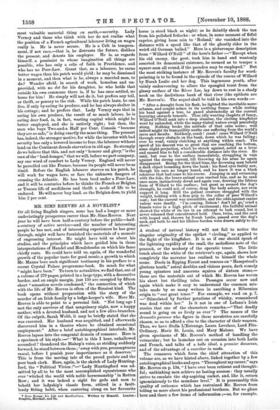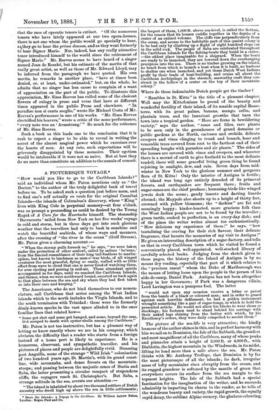MR. SIMS REEVES AS A NOVELIST.* Or all living English
singers, none has had a longer or more undeviatingly prosperous career than Mr. Sims Reeves. Next year he will have been half-a-century before the public—half- a-century of active service—and the number of interesting people he has met, and of interesting experiences he has gone
through, might well have furnished the materials of a memoir of engrossing interest. He might have told 11B about his studies, and the principles which have guided him in those interpretations of Handel and Mendelssohn on which his fame chiefly rests. He could have told us, again, of the wonderful growth of the popular taste for good music, a growth to which Mr. Manna bore such significant testimony in his preface to a recent Crystal Palace programme-book. So much for what "might have been." To turn to actualities, we find that, out of a volume of 279 pages, printed in a large type, with a decorative border, and an ample margin, just 150 are occupied by fifteen short "sensation novels condensed," the connection of which with the life of Mr. Reeves is often of the flimsiest kind. The book opens without preparation with the story of the murder of an Irish family by a lodge-keeper's wife. Here Mr. Reeves is able to point to a personal link. " Not long ago I met the only survivor of that sanguinary night, now a happy mother, with a devoted husband, and not a few olive-branches. Of the culprit, Sarah Webb, it may be briefly stated that she was executed. Her husband was acquitted, and I afterwards discovered him in a theatre where he obtained occasional employment." After a brief autobiographical interlude, Mr. Reeves lapses into the congenial domain of romance. Here is a specimen of his style:—" What is this I hear, unhallowed scoundrel!' thundered the Bishop's voice, as striding suddenly forward, he stood between them; away with you, presumptuous rascal, before I punish your impertinence as it deserves." This is from the moving tale of the proud prelate and the poor bank clerk. Here, again, is the sketch of Lady Hunting ford, the "Political Vivien :"—" Lady Hnntingford was ad- mitted by all to be the most accomplished equestrienne who ever witched the world with noble horsemanship 'in Rotten Row ; and it was indeed a sight for gods and men to behold her ladyship's classic form, attired in a fault- lessly fitting habit, when cantering along on her favourite
• Sims Herm : his Life and R.collections. Written by Himself. London : Iiiinspkin, Mamba% and Co.
horse (a steed black as night) as he daintily shook the tan from his polished fetlocks : or when, in some moment of fitful caprice, giving loose rein to 'Roland,' she vanished into the distance with a speed like that of the ghostly rider in the weird old German ballad." Here is a picturesque description from "Willard O'Neill" of the hero's father :--" Except when his old enemy, the goat, took him in hand and wantonly asserted its demoniacal existence, he seemed as to temper a square man all round, if the paradox may be employed." But the most striking instance of Mr. Reeves's faculty for word.
painting is to be found in the episode of the rescue of Willard by Norah Leslie and her dog. This ingenuous youth, after vainly endeavouring to allure the spangled trout from the glassy surface of the River Lee, lay down to rest in a shady nook on the declivitous bank of that river (the epithets are Mr. Reeves's). The sequel shall be told in his own words :—
"After a draught from his flask, he lighted the inevitable meer- schaum, and sought solace in its soothing fumes : while resting his head against a tree, he gazed abstractedly at the current hurrying onwards beneath. Thus idly weaving chaplets of fancy, Willard O'Neill sank into a deep slumber, the circling kingfisher went by unheeded, while the many-tinted waters swept peacefully along. Nothing broke the solitude of that calm scene ; well indeed might its tranquillity soothe one suffering from the world's cares and deceits. Suddenly, crash ! crash ! came Willard O'Neill through every obstacle on the bank, down which he was falling; over he went, vainly clutching at anything within reach. The speed of his descent was so great that ere reaching the bottom, some slight projection, which he struck against, acted as a lever and caused him to fall a considerable distance into the river. He sank, but rose to the surface immediately, struggling in vain against the strong current, till throwing up his arms he again disappeared. Rising for the third time, the drowning man beheld a dark object bounding down the bank : his fixed eyes feebly saw, though his ears no longer heard, and be knew it was a black retriever that had come to his rescue. Jumping in and swimming with the tide, the brave animal soon reached him, and as he sank once more, instinctively dived and again rose, drawing the lifeless form of Willard to the surface; but great as seemed the dog's strength, he could not, of course, drag the body ashore, nor even support it long. Still the gallant creature struggled with the weight, holding with a firm grip to the collar of poor Willard's coat; but the current was irresistible, and the odds against canine valour were deadly. I'm coming, Nelson ! don't let go,' cried a female voice in a high pitch of excitement; the faithful animal showed the white of its eye in an attempt to look round, but it never released that concentrated hold. Once, twice, and the cord with looped end, thrown by Norah Leslie, passed over the dog's neck, and both he and his lifeless burden were drawn safely to the shore."
A student of natural history will not fail to notice the singular originality of the epithet "circling," as applied to the flight of the kingfisher. It is as if one should speak of the lightning rapidity of the snail, the melodious note of the peacock, or the modesty of the operatic tenor. The little touch about the white of the retriever's eye, again, shows how completely the narrator has realised to himself the whole scene. Duels in Epping Forest and rescues on "Hampstead's glorious heath," astral doubles and vicious peers, dark comely young spinsters and amorous squires of sixteen stone,— these are the materials out of which Mr. Reeves has woven his short but thrilling tales. Passages occur now and again which make it easy to understand the common mis- take made by so many writers in ascribing a Hibernian origin to "our great tenor." For example, we read on p. 7, —" Stimulated by further potations of whisky, womanhood was dead within her." Is it not in one of Lefantes Irish stories that one of the characters remarks,—" That deadly sound is going on as lively as ever "? The names of the
dramatis persona, who figure in these novelettes are carefully chosen, so as to afford a clue to the character of their wearers. Thus, we have Stella L',Estrange, Laura Lovelace, Lord Fitz- Ordinary, Marie St. Louin, and Mary Malone. We have
given specimens of Mr. Reeves's method of handling the
vernacular; but he launches out on occasion into both Latin and French, and talks of a belle ideal, a premier danseuse, and of the advantage of a suavitur in modo.
The romances which form the chief attraction of this volume are, as we have hinted above, linked together by a few autobiographical hooks and eyes. "Throughout my career," says.
Mr. Reeves on p. 134, "I have ever been reticent and thought-.
ful ; unthinking men achieve no lasting success : they usually strive to emulate the sky-aspiring rocket, and, like it, return ignominiously to the mundane level." It is presumably this_ quality of reticence which has restrained Mr. Reeves from telling us more about his professional brethren. But we glean here and there a few items of information ;—as, for example,
that the race of operatic tenors is extinct. "Of the numerous tenors who have lately appeared at our two opera-houses, there is not one whom the public would go specially to hear, ai,they go to hear the prima donnas, and as they went formerly to hear Signor Mario. Nor, indeed, has any really attractive tenor introduced himself to the world since the retirement of Signor Mario." Mr. Reeves seems to have heard of a singer named Jean de Reszke, but his estimate of the merits of that really great artist, BA well as those of Mr. Edward Lloyd, may be inferred from the paragraph we have quoted. His own merits, he remarks in another place, "have at times been denied, or, at least, under-estimated," but, on the whole, he admits that no singer has less cause to complain of a want of appreciation on the past of the public. To illustrate this appreciation, Mr. Sims Reeves has culled some of the choicest flowers of eulogy in prose and verse that have at different times appeared in the public Press and elsewhere. "In paradise non si canta meglio," wrote Sir Michael Costa of Mr. Reeves's performance in one of his works. "Mr. Sims Reeves electrified his hearers," wrote a critic of the same performance, "every note was an Armstrong.' " So much for the reticence of Mr. Sims Reeves.
Such a book as this leads one to the conclusion that it is rash to expect a singer to be able to reveal in writing the secret of the almost magical power which he exercises over the hearts of men. At any rate, such expectations will be grievously disappointed by these memoirs. Their egotism would be intolerable if it were not so naïve. But at best they do no more than constitute an addition to the annals of conceit.







































 Previous page
Previous page